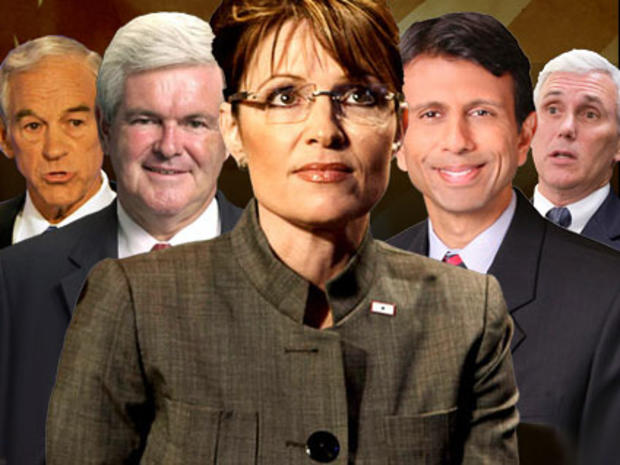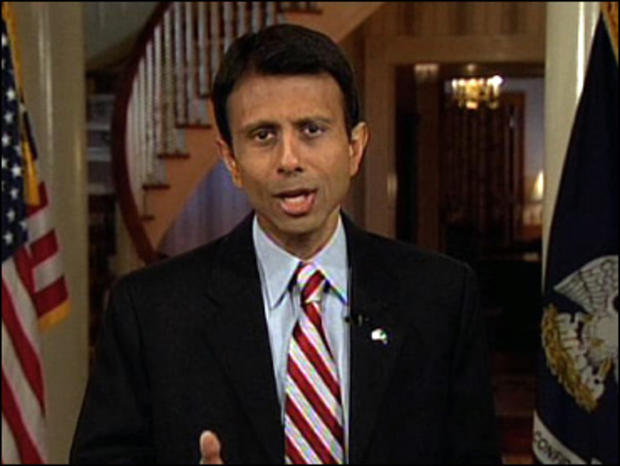The Battle Begins for 2012 GOP Contenders
Every four years, in between presidential elections, conservative activists gather to take stock of some of the most prominent names in the Republican Party -- and consider which of them has what it takes for a successful run for the White House.
That gathering, the Southern Republican Leadership Conference, takes place this Thursday through Saturday in New Orleans. Among the speakers will be Newt Gingrich, Ron Paul, Bobby Jindal, Michael Steele, and Sarah Palin, whose speech will be closely watched for signs as to whether the former Alaska governor is serious about a presidential run or is opting instead a lucrative media career.
Notably absent, oddly enough, will be the only two prominent Republicans who have been doing the most staff hiring, fundraising, travel and networking to lay the groundwork for a 2012 run: Former Massachusetts governor and 2008 GOP presidential hopeful Mitt Romney, who has elected to continue his book tour instead of coming to the conference, and Minnesota Gov. Tim Pawlenty, who pulled out in order to attend a welcome home ceremony for members of the armed forces.
Both men are widely expected to jump in the race, but both have their liabilities. While Romney has worked hard to establish his conservative credentials after taking moderate positions on some issues as Massachusetts governor, some on the right continue to be skeptical of him. And the passage of a health care reform package that looks a lot like the health care bill Romney signed into law in Massachusetts has had the ex-governor straining to make the case that the Massachusetts model has legitimate differences with what conservatives derisively call "ObamaCare."
Pawlenty, meanwhile, is unknown to most Americans. While he has been making all the right moves to prepare for a presidential run, including raising money for and endorsing anti-spending Republican candidates, he has not come close to capturing the imagination of the GOP faithful. Perhaps in an effort to break through and generate a little buzz -- and also draw a distinction with Romney -- Pawlenty is pushing a lawsuit to overturn the health care bill. (He's also not skipping the conference entirely -- organizers tell Hotsheet he plans to send in a video address for the event.)
The current landscape means that many conservatives are hoping that a plausible alternative to Pawlenty and Romney emerges in the coming months -- perhaps spurred by a winning speech at the conference seen by many as the unofficial kickoff to primary campaign season.
Palin, seemingly the brightest light in the GOP, remains a polarizing figure who many Republicans believe could not win in a general election; she has also laid little groundwork for a presidential run. The activists gathered at the conference will be looking for signs that the 2008 GOP vice presidential nominee is interested in a run and willing to do the necessary hard work to win -- or if she seems content to focus on her burgeoning media career, including her planned television show, "Sarah Palin's Alaska."
Jindal, the Louisiana governor, has steadily climbed back into the good graces of the GOP ran-and-file despite a disastrous response to President Obama's address to a joint session of Congress in February of last year. But his appearance may be more about continuing to build up goodwill than an attempt to set up a run that could be seen as premature.
Gingrich, meanwhile, seems an ever-present part of the presidential speculation who enjoys his image as an ideas man and elder statesman in the party. The former House speaker has said repeatedly he is considering a run -- though many GOP insiders believe Gingrich, who has past personal issues that would come under scrutiny if he were to enter the race, is simply trying to keep up his public profile and speaking fees.
Paul, of course, is a libertarian-leaning Republican who could well duplicate his 2008 run, but he is seen as a candidate with passionate but limited appeal within the party. Paul won the straw poll at the Conservative Political Action Conference in February, though critics were quick to point out that the respondents were not necessarily representative of the GOP as a whole.
As for Steele, no one expects a presidential run from the Republican National Committee chair. But the speech is important regardless, since Steele has come under fire after a string of scandals, including, most recently, revelations that the committee paid a nearly $2,000 reimbursement for a group of young donors to enjoy a night out at a bondage-themed nightclub.
Could a New Report Spell More Trouble for the RNC?
Money Flows into RNC, but Steele Still Hounded
Steele will be looking to convince activists that he is not running a free-spending organization and convince them to continue donating to the RNC -- and to not forsake the organization in favor of a shadow RNC group called American Crossroads or direct their donations primarily to candidates or campaign committees.
That brings us to the lesser-known speakers, some of whom are plausible candidates to eventually emerge their party's standard bearer. (Keep in mind, most Americans didn't know much about Barack Obama back in 2006.) Among them are Rep. Mike Pence, the House Republican Conference Chairman from Indiana who calls himself "a Christian, a conservative and a Republican, in that order." Pence has been traveling the nation, ostensibly to help House Republicans raise money. But the trips have driven speculation that he's been testing the waters for a 2012 run, possibly with the backing of many in the Tea Party movement.
Also speaking is former Pennsylvania Sen. Rick Santorum, who Pennsylvania political scientists G. Terry Madonna and Michael Young say may be laying the groundwork for push for the nomination; so is Mississippi Gov. Haley Barbour, the head of the Republican Governors Association, who has notably declined to shut the door on a run.
One key question going into the conference is what rhetoric Republicans will offer when it comes to the health care bill. While anger in the base has driven a push for repeal, many GOP lawmakers see risks of voter backlash in such an effort; the comments at the conference could set the tone for the GOP message on the bill going into the midterm elections. (One message now being floated is "repeal and replace" -- which comes with the implicit promise that the more popular of the bill's provisions, like bans on turning people away for pre-existing conditions, would not be eliminated if Republicans attain enough power to be able to repeal the bill.)
After listening to the speakers, attendees at the conference will vote in the straw poll; if Romney wins despite not attending (or comes in second behind Paul) it will be taken as a sign of his strength. But it's worth noting that the winner of the 2006 straw poll, Sen. Bill Frist, never even entered the 2008 race.
A victory by a more below-the-radar lawmaker such as Pence could help generate buzz and establish him as a strong alternative to Romney and Pawlenty.
On the flip side, a particularly poor performance would be taken as a sign that a candidate has little institutional support -- a fate Palin, who came in a distant third at the CPAC straw poll, will want to avoid if she is ultimately interested in taking the plunge.
Tom Coburn Knocks Fox News, Says Nancy Pelosi is a "Nice Person"
Watch Brian Montopoli discuss his story on CBSNews.com's politics Web show "Washington Unplugged":

